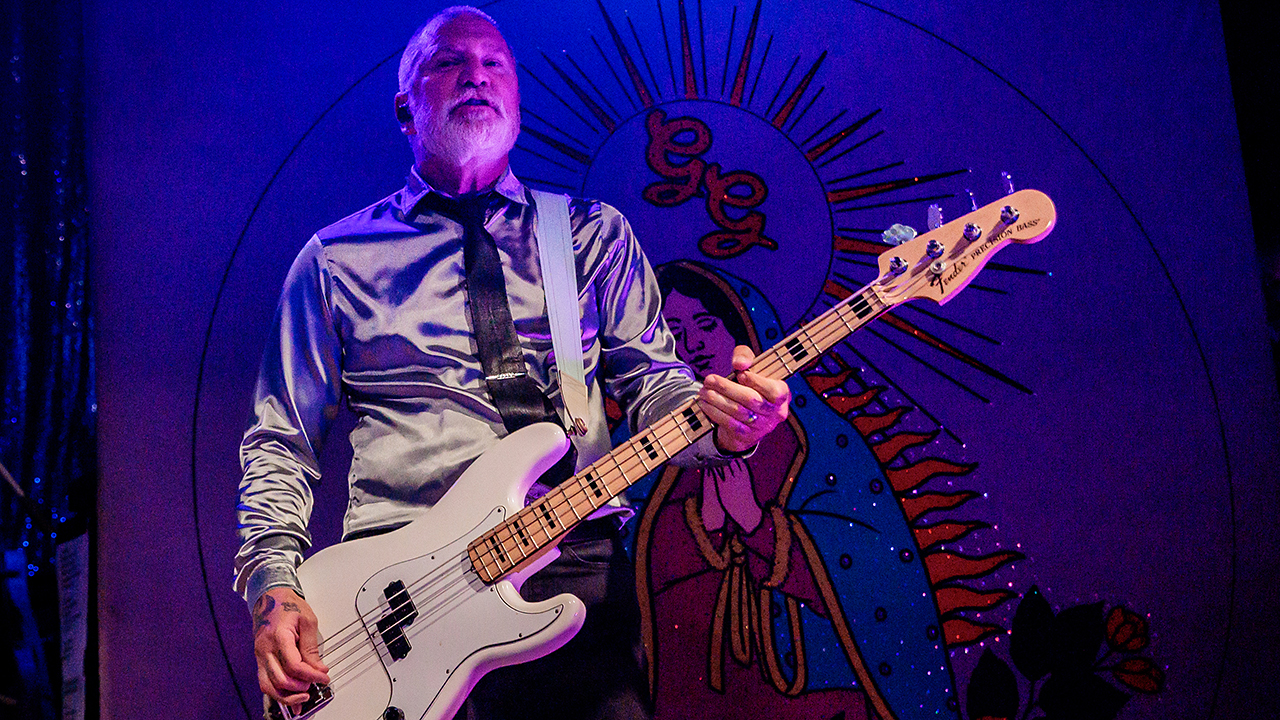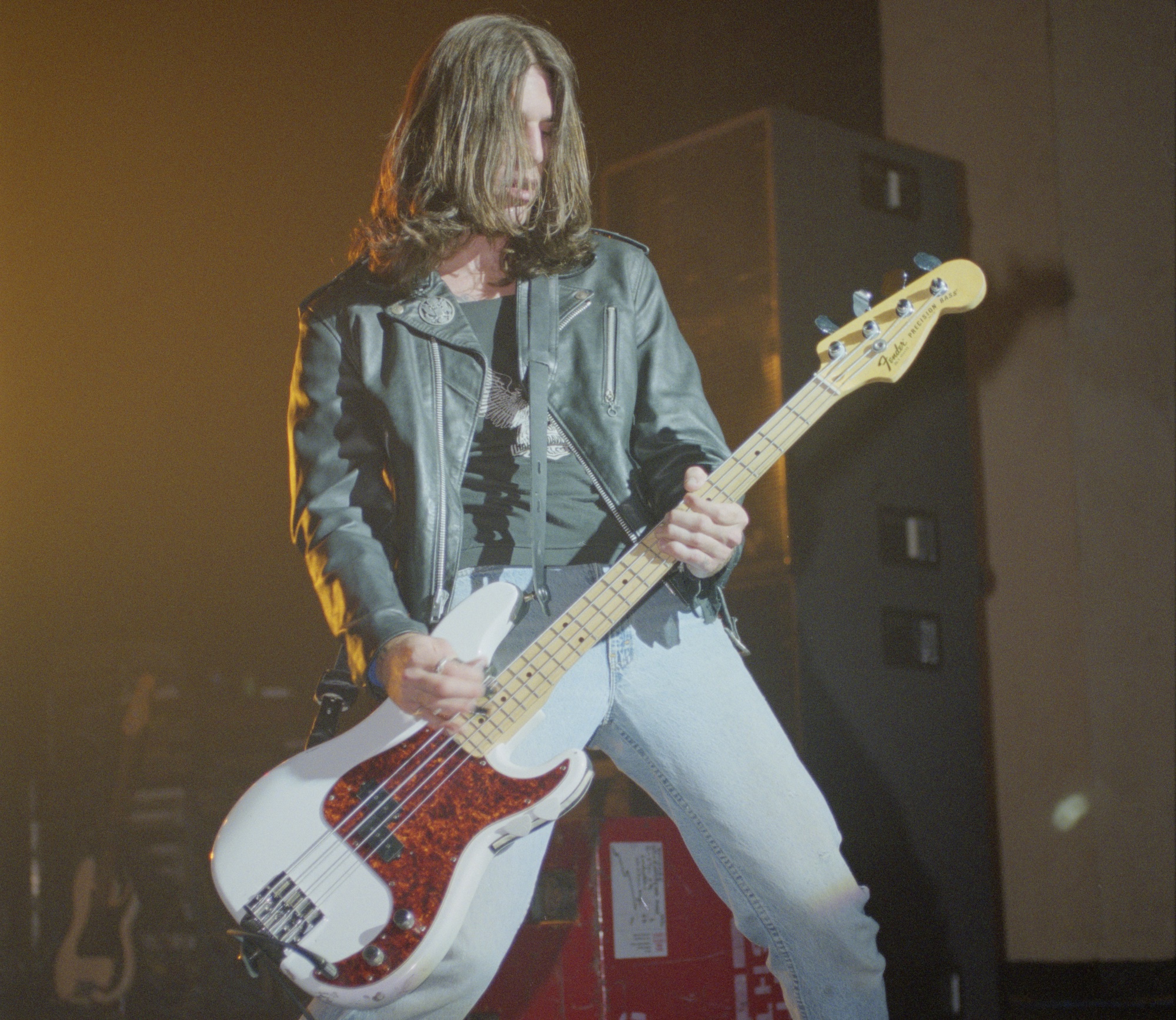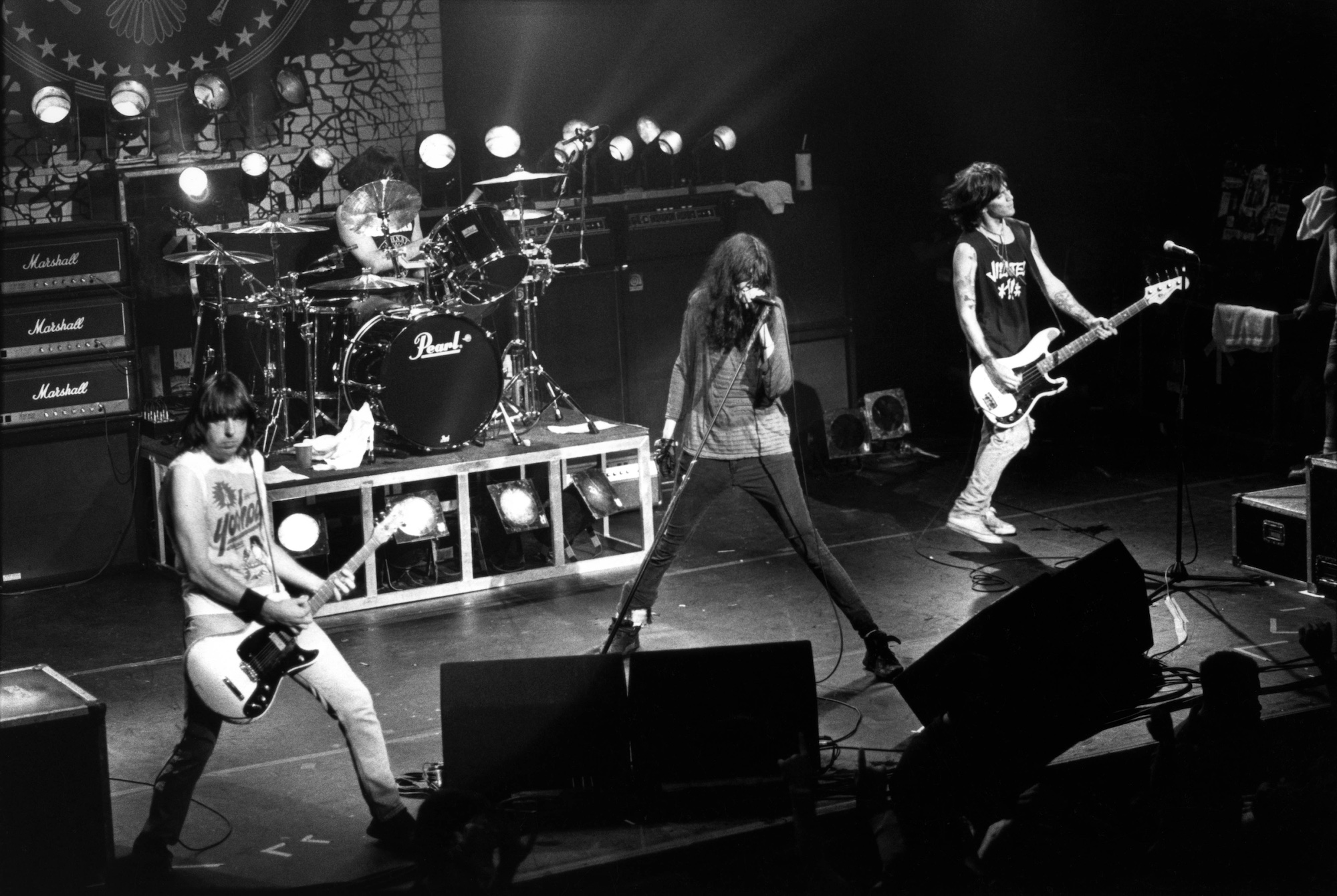“By the time I realized I was in, I was a deserter from the Marine Corps. Johnny was was like, ‘Do your time. When you get out, you’ve got a job’”: CJ Ramone landed the gig of a lifetime with the Ramones, but his audition got him sent to naval prison
Replacing Dee Dee was no easy task, but CJ helped energize the band’s last stand by relearning how to play and using his predecessor’s rig – and he has no regrets about how it ended

All the latest guitar news, interviews, lessons, reviews, deals and more, direct to your inbox!
You are now subscribed
Your newsletter sign-up was successful
Growing up on Long Island, Christopher Joseph Ward, who’d become known as CJ Ramone, was a metalhead with a soft spot for punk rock. But even though the area didn’t have much of a punk scene in the early ‘80s, the fact that his knee kept him from playing sports led him to pick up the bass.
“I sat down with the it and sounded things out,” he says. “I kind of taught myself a couple of basslines and I was off and running.”
When The Ramones and original bassist Dee Dee parted ways in 1989, CJ – by that time enlisted in the United States Marines – risked jail time by attending the open auditions. He got the gig, but not before the Marines locked him up.
The band waited for him to get out, and so began a seven-year, three-album stint with the punk icons. CJ proved pivotal on 1992’s Mondo Bizzaro – which yielded fan favorite Poison Heart – the 1993 covers album Acid Eaters, and the 1995 swansong, ¡Adios Amigos!. He stuck around for a final tour, culminating in 1996 at The Palace in Hollywood.
The passings of Joey, Johnny, and Dee Dee within a decade was reinforcement of their decision to break up.
“They felt like it was time, and I agreed with them,” CJ says. “They all died within a couple of years of retiring.
“Johnny was like, ‘I don’t wanna go up onstage and not be as good as we were. I wanna go out while we’re still playing fast, and sound good.’ And that’s how it went.”
All the latest guitar news, interviews, lessons, reviews, deals and more, direct to your inbox!
Since then, CJ has dropped four solo records, and recently he’s been touring with The Gimmie Gimmies. He doesn’t take his Ramones legacy lightly.
“Everyone said I gave the band a shot in the arm,” he states, “and that I brought the energy back to the live show. I worked hard to try and keep them relevant, and sounding as good as they could.”
Did you choose the bass, or did it choose you?
“It kind of chose me. I was really into sports, but I had to wear knee braces for two years and it knocked me out. My old man was like, ‘You can’t sit around and do nothing.’
“I was hanging around a bunch of guys that had a band, but no bass player. I helped them set up and stuff. Then I was like, ‘I can get a bass.’ My old man bought me a bass from Gil Brieners Music Store on Deep Park Avenue [in New York] – it was an imitation P-Bass.”
How did you get into punk music?
“Originally I was playing whatever the guys were playing. We did Neil Young, Billy Joel, The Cars, Black Sabbath. Anything we could handle. I got really into heavy metal. I was into punk, but nobody on Long Island actually played it. Guys like Geezer Butler and [Iron Maiden's] Steve Harris were probably my favorites. And I liked progressive stuff, like [Yes'] Chris Squire.”
Were you a Ramones fan?
“I was definitely a Ramones fan. For their style, there was nobody else like them. But I never played with a pick until my first Ramones audition – I messed around with it a couple of times, but I played with my fingers until that first audition. I knew what they were looking for.”

How did you get the call to audition for The Ramones?
“I had a friend who played in a band with Joey’s brother. He called and said, ‘Hey, the Ramones are having open auditions.’ I learned a couple of songs really quickly, went down to the audition and introduced myself. Because I was in the Marine Corps, I had no expectation of making it, which made me even more relaxed!”
What songs did you play?
“They asked me what songs I knew and I said, ‘I can play I Wanna Be Sedated.’ We played that, we talked a little bit, and Johnny and I just shot the breeze. I was wearing a Yankees hat and Johnny was big into the Yankees.
“We played the song one more time then Joey came in, and I said, ‘My buddy plays with your brother,’ and had a little conversation with him. And then I left, with no expectations of a callback.”
How did you find out you’d got the gig?
“They were like, ‘Learn a couple more songs and come back next Monday.’ I went back and forth over the course of a month, learning songs, showing up, and trying to get used to playing with a pick.
“I had to spend a fair amount of time getting used to it. But not just picking, because the Ramones played all downstrokes. Some people would view that as rudimentary, but I didn’t. It was what they were looking for.
“I thought I was gonna get the job because I was showing up earlier, and staying later, and that most of the guys I saw weren’t getting callbacks.”
At one point you got in trouble with the Marines for being away.
“By the time I realized I was gonna get it, I was a deserter from the Marine Corps. I called the base and they sent the cops over, picked me up, and took me to jail. I went to Fort Hamilton in Brooklyn then I got transferred to the naval brig in Philadelphia. From there I went to Quantico, Virgina, and that’s when the band caught up with me.
“I was actually sitting in the common area and the guard on duty was like, ‘Hey, you’ve got a phone call,’ and it was Johnny Ramone.’ I was like, ‘Johnny, I’m really sorry. I should have told you what was going on. I’m gonna be here for a couple months, and then they’re gonna process me out.’ He was like, ‘Do your time. When you get out, you’ve got a job.’
I told my girlfriend, ‘I just had a weird exchange with Dee Dee.’ He was gone two weeks later
“I was there for maybe six weeks waiting to be discharged. I got out on a Friday afternoon and went home, then I called their tour manager, Monte Melnick, and said, ‘I’m back!’ He said, ‘Take the weekend off. We start rehearsing on Monday.’
“We did five weeks of rehearsals, and I learned around 42 songs. I did my first Ramones show on September 30, 1989, in Leicester, England.”
What rig did you have on the road?
“I inherited the amps that Dee Dee had used. They weren’t the originals because The Ramones had all their gear stolen at one point, but he’d been using them since the late ‘70s. I played through an SVT and a little 115 stage amp, then I moved to an Acoustic. I forget the model, but it sounded really good. The SVT was my go-to even before I got into The Ramones.”
What was it like working on your first Ramones album, 1992’s Mondo Bizarro?
“It was amazing – Ed Stasium, who’d produced the early Ramones records, came back. I’d been in the studio before, but our pre-production made the whole thing a lot easier. Joey didn’t come to rehearsals, so I learned all the vocal lines. I sang the guide tracks and all that stuff.
“Most of my bass lines were knocked out in one or two takes, with very minimal punch-ins, because we were so rehearsed. It was pretty painless.”

What was your perspective on their decision to retire, and put out a final album, ¡Adios Amigos!?
“The retirement was planned quite a long ways before it was announced. It had been 22 years – no matter how cool your job is, it’s a long time. They were like, ‘Okay, we’re done.’ They felt like they’d gotten the band as popular as they were ever gonna be.
“I was with them for seven years, and we did more shows then than they did in the 15 years before. That’s how intense it got at the end. They were ready to pack it in.”
Was that hard for you to stomach?
“It was kind of bittersweet. I’d have loved the band to go on longer, but Joey had been diagnosed with lymphoma in ’94. I was singing more and more songs to give him a break. And Johnny was pretty worn out, too.”
I would never compare myself to Dee Dee – he’s one of the guys who invented the punk rock sound and look. I just did the best job I could, and tried to make sure that the fans enjoyed themselves
Did you keep in touch with them before their deaths?
“I didn’t talk to them as often as I’d like. I was able to say goodbye to Johnny; I think he died two days after I saw him last. I had an opportunity to tell him, ‘Hey, thanks for everything.’
“I didn’t really get to say goodbye to Joey. But the last time we talked, we had a good conversation – we had a couple of laughs. I left it off good with Dee Dee, too. The last time I saw him in New York City, I got onstage and did a song with him.
“He was playing a corporate event and doing all covers. We had a little moment backstage after the show. He said, ‘CJ, you were always cool and treated me with respect. You’re a good person.’ That was so out of character for Dee Dee.
“I said to my girlfriend when I left, ‘I just had a weird exchange with Dee Dee.’ And sure enough, he was gone two weeks later, I think. But I got to have a good last conversation with each of them.”
“I would never compare myself to Dee Dee – he’s one of the guys who invented the punk rock sound and look. I just did the best job I could, and tried to make sure that the fans enjoyed themselves. I’m totally happy with my part in their legacy.”
Catch us up on what you’re doing now.
“I put four records out on my own. I fought hard for the better part of 10 years, but in 2019, I announced I was gonna stop touring as CJ Ramone and maybe do some other stuff. As soon as I announced that, The Gimmie Gimmies hit me up and asked me to go out on tour with them.
“I was like, ‘Well, as long as it’s not gonna be a full-time thing.’ And, of course, it’s turned into a full-time thing! I’m now touring more than I did on my own. We put out a record last year, we’re touring this year, and we’re possibly looking at another record next year. Hopefully that’ll keep me on the road and keep me playing.”
- Stay up to date via CJ Ramone’s website.
Andrew Daly is an iced-coffee-addicted, oddball Telecaster-playing, alfredo pasta-loving journalist from Long Island, NY, who, in addition to being a contributing writer for Guitar World, scribes for Bass Player, Guitar Player, Guitarist, and MusicRadar. Andrew has interviewed favorites like Ace Frehley, Johnny Marr, Vito Bratta, Bruce Kulick, Joe Perry, Brad Whitford, Tom Morello, Rich Robinson, and Paul Stanley, while his all-time favorite (rhythm player), Keith Richards, continues to elude him.
You must confirm your public display name before commenting
Please logout and then login again, you will then be prompted to enter your display name.



